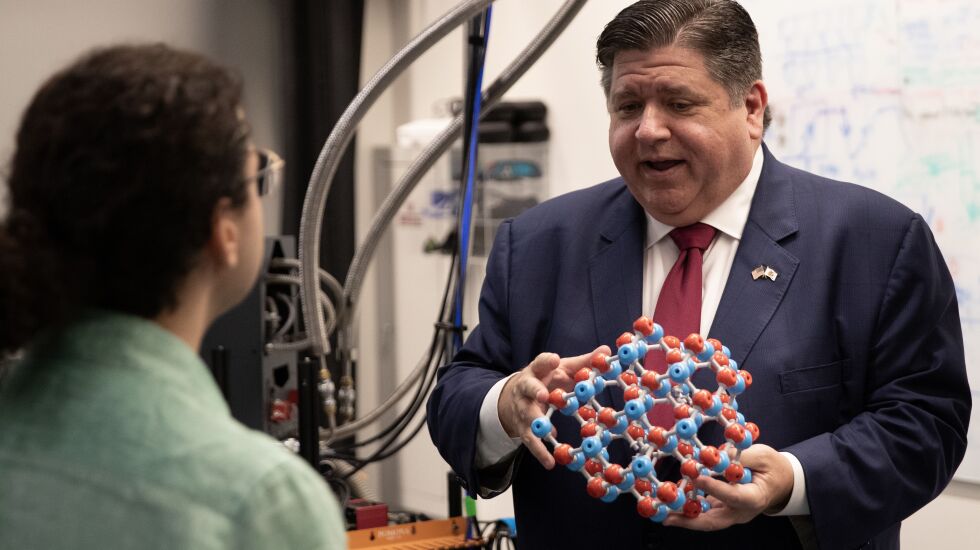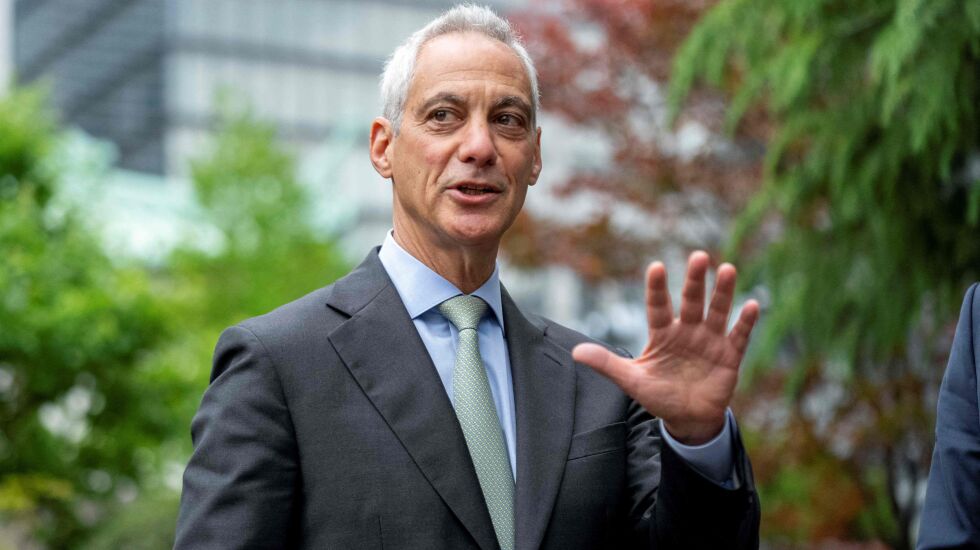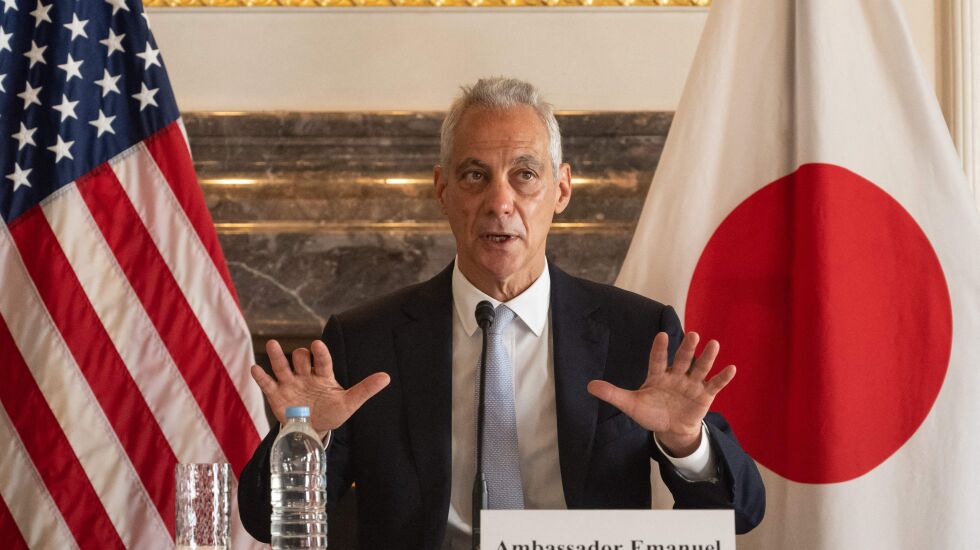
It is not an overstatement to say that Gov. J.B. Pritzker is enamored with quantum computing.
The governor’s frequent mention of the complex science, both publicly and privately, prompts eye rolls from some of his top staffers. But Pritzker says he truly believes his persistence will put Illinois on the world stage as “the Silicon Valley of quantum development.”
It’s too early to tell whether quantum leaps ahead in Illinois. But at the University of Chicago, researchers are already working on experiments such as creating a super sensitive quantum sensor that could detect biological and chemical changes at the molecular level — leading to instant detection of diseases. Other work is setting the path toward data transfers that cannot be breached.
The science behind it all is unbelievably complex.
“Let’s be honest. I don’t know enough,” former Mayor Rahm Emanuel, another key Illinois quantum booster, told the Sun-Times. “But I know it’s the cutting edge of the next generation.”
In a layperson’s terms, the Internet and the technology in your phone work by breaking down long streams of pulses representing a zero or a one. Quantum computing creates an infinite combination of zeros and ones, meaning it can produce a huge number of solutions simultaneously.
Leaving the science to the experts, the governor and former Chicago mayor are instead consistently bringing attention and funds to support the experimental field. Both influential Chicagoans firmly grasp the potential.
Quantum discoveries could mean faster development of vaccines and unhackable computers providing foolproof protection of health, financial and government data. That obviously suggests heavy national security implications of the evolving science.
‘Long, incubated investments’
Pritzker, the billionaire heir and entrepreneur turned politician, is competitive, and he understands the value of quantum within the national security realm and in the worlds of medicine and technology.
Even though he is not an expert in science, the governor certainly understands the dollar signs that will come with all those additional zeros and ones.
According to global consulting firm McKinsey & Company, investors put $2.35 billion into quantum technology startups in 2022. Four industries — automotive, chemical, financial services and life sciences — could potentially gain up to $1.3 trillion in value by 2035.
The governor is fully aware the steps he is taking now might go unnoticed even long after he leaves state government. But he can wait.
“Twenty years from now, we’ll be reading about Chicago and Illinois being the leader in this burgeoning, amazing new space and industry. And I’ll take the victory lap,” Pritzker said in an interview with the Sun-Times. “I’ll be 78. But I’ll take the victory lap then. Because these are long, incubated investments that you make.”

During a roundtable at the University of Chicago last month with some of the world’s leading quantum scientists and researchers, Pritzker had a simple unscientific question: How can Illinois attract the best in the quantum world, and what can he do as governor to help facilitate that?
Researchers cited the intense international competition for talent, the fast-changing nature of the industry and, in one instance, Illinois taxes for large corporations as reasons some companies weren’t landing in Illinois, and why some of the best minds have left.
“So you don’t buy into any of the BS that’s out there, it’s a hell of a lot cheaper from a tax perspective than California,” Pritzker said of Illinois. “But yes, there are other places we’d like to attract people from that maybe have zero income tax.”
He echoed the calls for retention during a tour of the university’s quantum labs, asking each graduate student where they were from and whether they planned to stay in Chicago after their research work concluded. Most said yes.
‘Just basically spitballing’
When he was mayor, Emanuel helped to jumpstart Chicago’s path to quantum development in 2018, announcing the University of Illinois at Urbana-Champaign would join the University of Chicago’s efforts in quantum technology with the Fermi and Argonne National Laboratories as part of the Chicago Quantum Exchange.
The Chicago Quantum Exchange, first launched in 2017 with Argonne and Fermi, now has one of the largest teams of quantum researchers in the world.

At the 2018 news conference announcing the universities’ role in the partnership, Emanuel literally threw up his hands about the science behind the technology. Five years later, Emanuel, now the U.S. ambassador to Japan, still acknowledges the concept is complex.
“I’ve read more in the last three years,” Emanuel said in a phone interview from Japan. “That said, I think even the people involved in it are just, they’re just basically spitballing.”
“They too don’t know where this is gonna go. And it’s so unformed, but they know it’s essential,” Emanuel said. “That’s what makes it, I think, it’s more the unknown and the dynamism around that makes it interesting. But the spinoff of this is going to be unprecedented.”
Emanuel in May helped to secure a $150 million deal between the University of Chicago and the University of Tokyo to support quantum research and workforce development.

That includes a 10-year, $100 million plan with IBM and the universities to develop the blueprints of a quantum supercomputer — and $50 million over 10 years from Google to accelerate the development of a quantum computer and to help train the quantum workforce. Pritzker also included $200 million in the state’s Rebuild Illinois capital program for quantum research.
Illinois is now home to four of the country’s top quantum labs, with the state consistently receiving federal funding for quantum research.
‘We really are the leader in the United States’
During a July trade mission to the United Kingdom, Pritzker brought along some of the city’s leading quantum researchers for a roundtable discussion at the University of London. And in a July 19 call with reporters, Pritzker boasted about Chicago’s quantum future.
“We really are the leader in the United States that people look to, the University of Chicago, the University of Illinois, the duality accelerator at the University of Illinois, all of that, an exciting prospect for tremendous growth in something that I think will lead to Illinois becoming the Silicon Valley of quantum development,” Pritzker said.
Pritzker said he first became interested in quantum in 2015 — as a “business endeavor.” When he became governor in 2018, he realized he could move that interest into the public sector, with the goal of helping the state’s economy and improving national security.
In essence, he wants to be on the front line of a burgeoning industry, like those who made early investments in the Internet. Pritzker said he began those investments in 1995.

This time he’s doing the work outside of the investment world, according to his campaign. A spokeswoman said Pritzker did not invest in quantum or quantum-related companies before becoming governor — a time when there weren’t a lot of quantum investment choices. As governor, his investments are tied up in a “blind trust” — although he is required to release the names of companies in which he invests within a statement of economic interest.
Since 2018, 40 private companies have joined the Chicago Quantum Exchange, including Boeing, IBM, Toshiba and Verizon. The companies are working to advance quantum research and expand career opportunities for the future quantum workforce.
“When you move into government, you start to see … what the advantages are for an economy more broadly, not just as a business investment, of infusing quantum into various aspects of life and then think about the national security implications,” Pritzker said.
‘We’re not doing enough’
Pritzker says some of his staffers laugh at him when he brings up quantum — but he pushes back.
“I’m sort of a geek about a few things that they look at me and say, ‘Nobody else cares,’” Pritzker said. “I do think these are things that we have to do. They don’t get a lot of attention sometimes.”

There’s also a race to beat China in quantum development — and that’s a focal point for the governor, and for President Joe Biden, whose administration officials have publicly said they would enact export controls with China when it comes to quantum, semiconductors, AI, biotechnology and clean energy technologies. And the Chips and Science Act included funding for quantum programs and development.
Biden in May 2022 also signed a national security memorandum that would outline his administration’s plan to address the risks posed by quantum computers to America’s cybersecurity — meaning when quantum computers reach a certain point, they will be able to break cryptography that currently secures digital communications on the Internet.
But as the U.S. races to advance the quantum field, Pritzker said he’s concerned the U.S. isn’t doing enough to beat China to the finish line.
“That’s a problem. And we have the advantage of our entrepreneurial private industry. It tends to move faster than governments do. But right now ... there are grants from the federal government that start the ball rolling.
“And so you need a lot of investment in that area in order to end up having our industry kind of grab the ball and run with it,” Pritzker said. “And I’m concerned, I will say, that we’re not doing enough. And if it’s a global competition between China and the United States, we shouldn’t fail at this.”
‘Exciting part is actually the things that we don’t know’
With scrubs on his leather shoes and goggles over his eyes, the governor, slightly resembling one of the “Men in Black,” joined a tour of a University of Chicago lab last month led by Hannes Bernien, an assistant professor in molecular engineering.
In the lab, Bernien and students use laser beams called optical tweezers to trap atoms. The atoms are suspended in a vacuum so they can’t lose their quantum information. The goal is to see how many atoms survive through the imaging, a way to minimize errors in quantum computing — which are very sensitive to changes in temperature and pressure.

Bernien in June received a National Science Foundation award for his work — and $700,000 in funding to advance his research.
There is an equal sense of hope and uncertainty in the labs. It is just as Emanuel described: “spitballing.”
“I think the most exciting part is actually the things that we don’t know, the surprises in the lab when you do experiments with this many atoms with the single photos,” Bernien said. “There’s actually a lot that we don’t know that I think we will find out and discover.”







